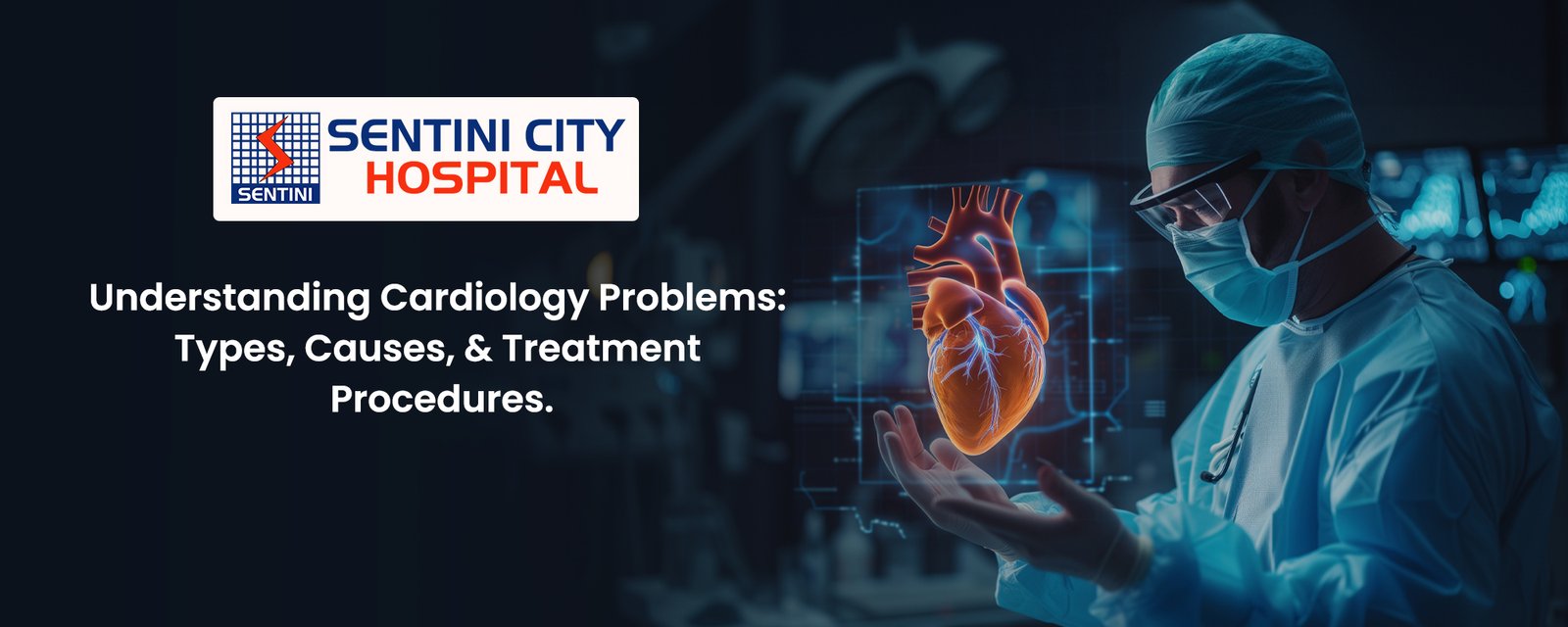Understanding Cardiology Problems: Types, Causes, and Treatment Procedures
Cardiology problems are a major health concern worldwide, affecting millions of people each year. Heart disease remains a leading cause of morbidity and mortality, and understanding its types, causes, and treatment options is essential for prevention and management. In this blog, we will explore the various types of heart-related issues, how they arise, and the treatment procedures available at Sentini City Hospital, one of the best cardiology hospitals in Hyderabad and Vijayawada.
Types of Cardiology Problems
Cardiology encompasses a wide range of heart-related issues. Some of the most common types include:
- Coronary Artery Disease (CAD)
CAD occurs when the coronary arteries become narrowed or blocked due to plaque buildup. This condition can lead to chest pain (angina) or heart attacks. Risk factors include high cholesterol, smoking, high blood pressure, and diabetes. - Heart Failure
Heart failure happens when the heart cannot pump blood effectively, leading to fatigue, shortness of breath, and fluid retention. It can result from various conditions, including CAD, high blood pressure, or previous heart attacks. - Arrhythmias
Arrhythmias are irregular heartbeats that can cause palpitations, dizziness, or even fainting. These may be benign or life-threatening, depending on the type and cause. - Valvular Heart Disease
This condition involves damage to one or more of the heart valves, affecting blood flow through the heart. Valvular heart disease can be congenital or result from conditions like rheumatic fever or degenerative changes. - Congenital Heart Defects
These are structural problems with the heart present at birth. They can range from simple defects that don’t require treatment to complex conditions requiring surgery. - Pericardial Disease
This condition involves inflammation of the pericardium, the sac surrounding the heart. It can lead to chest pain and other symptoms, often caused by infections or autoimmune diseases.
Causes of Heart-Related Issues
Understanding how heart-related issues develop is crucial for prevention. Common causes include:
- Unhealthy Lifestyle Choices: Poor diet, lack of exercise, smoking, and excessive alcohol consumption can increase the risk of heart disease.
- Genetic Factors: A family history of heart disease can significantly increase an individual's risk.
- Chronic Conditions: Diabetes, high blood pressure, and high cholesterol can lead to cardiovascular problems if not managed effectively.
- Stress: Chronic stress may contribute to heart disease, as it can lead to high blood pressure and other risk factors.
Symptoms of Cardiology Problems
Recognizing the symptoms of heart problems is vital for early intervention. Common symptoms include:
- Chest pain or discomfort
- Shortness of breath
- Palpitations or irregular heartbeats
- Fatigue or weakness
- Swelling in the legs, ankles, or feet
Diagnosis of Heart Conditions
Diagnosis typically involves several steps:
- Medical History and Physical Exam: A healthcare provider will review your medical history and conduct a physical exam to assess your symptoms.
- Diagnostic Tests: These may include:
- Electrocardiogram (ECG): Measures the electrical activity of the heart.
- Echocardiogram: Uses ultrasound to create images of the heart’s structure and function.
- Stress Testing: Evaluates how the heart performs under physical stress.
- Angiography: Involves injecting a dye into the coronary arteries to visualize blockages using X-ray imaging.
Treatment Procedures
Treatment for cardiology problems varies depending on the specific condition and its severity. Common treatment options include:
- Medications: These may include:
- Antihypertensives for high blood pressure
- Statins for cholesterol management
- Antiplatelet drugs to prevent blood clots
- Lifestyle Changes: Diet modifications, regular exercise, and quitting smoking are essential for managing heart disease.
- Interventional Procedures: These may involve:
- Angioplasty and Stenting: A balloon is used to open narrowed arteries, and a stent is placed to keep the artery open.
- Coronary Bypass Surgery: Bypasses blocked arteries to restore blood flow to the heart.
- Cardiac Rehabilitation: This supervised program combines education, exercise, and support to improve heart health.
- Advanced Treatments: In severe cases, treatments like heart transplants or implantable devices (e.g., pacemakers or defibrillators) may be necessary.
Best Cardiology Services in Hyderabad and Vijayawada
If you or a loved one is facing heart-related issues, seeking the right care is crucial. Sentini City Hospital is renowned as the best cardiology hospital in Hyderabad, providing comprehensive cardiac care. They employ state-of-the-art technology and a team of experienced cardiologists to ensure optimal patient outcomes.
In Vijayawada, the hospital is also recognized as the best medical care hospital, offering specialized services to address various cardiac conditions. Their commitment to patient-centered care and advanced treatment options makes them a top choice for cardiology services.
Conclusion
Cardiology problems can significantly impact your health, but understanding their types, causes, and treatment options can empower you to take charge of your heart health. Regular check-ups, a healthy lifestyle, and prompt medical attention can help prevent serious complications. If you’re searching for the top cardiology hospital in Vijayawada or need expert care in Hyderabad, Sentini City Hospital is dedicated to providing exceptional cardiovascular care tailored to your needs.
For more information about our services, visit Sentini City Hospital. Explore our advanced cardiology treatments and take the first step towards a healthier heart today!








